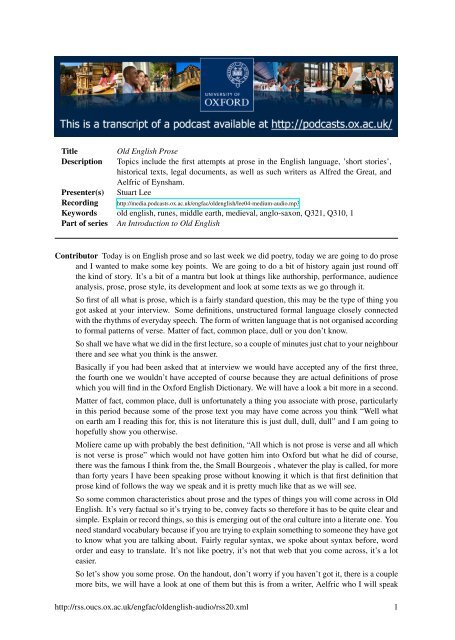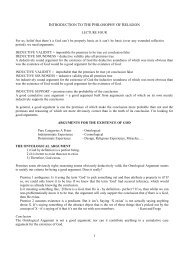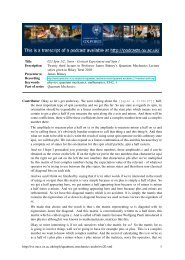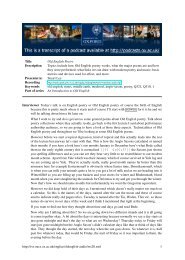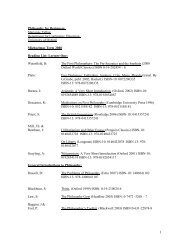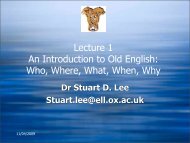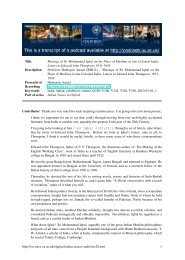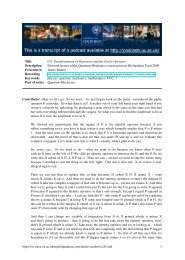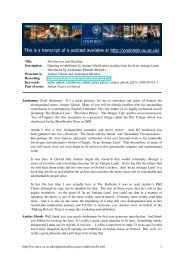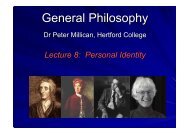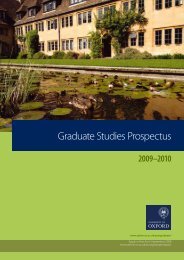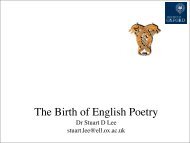Old English Prose - University of Oxford
Old English Prose - University of Oxford
Old English Prose - University of Oxford
Create successful ePaper yourself
Turn your PDF publications into a flip-book with our unique Google optimized e-Paper software.
TitleDescription<strong>Old</strong> <strong>English</strong> <strong>Prose</strong>Topics include the first attempts at prose in the <strong>English</strong> language, ’short stories’,historical texts, legal documents, as well as such writers as Alfred the Great, andAelfric <strong>of</strong> Eynsham.Stuart LeePresenter(s)Recording http://media.podcasts.ox.ac.uk/engfac/oldenglish/lee04-medium-audio.mp3Keywords old english, runes, middle earth, medieval, anglo-saxon, Q321, Q310, 1Part <strong>of</strong> series An Introduction to <strong>Old</strong> <strong>English</strong>Contributor Today is on <strong>English</strong> prose and so last week we did poetry, today we are going to do proseand I wanted to make some key points. We are going to do a bit <strong>of</strong> history again just round <strong>of</strong>fthe kind <strong>of</strong> story. It’s a bit <strong>of</strong> a mantra but look at things like authorship, performance, audienceanalysis, prose, prose style, its development and look at some texts as we go through it.So first <strong>of</strong> all what is prose, which is a fairly standard question, this may be the type <strong>of</strong> thing yougot asked at your interview. Some definitions, unstructured formal language closely connectedwith the rhythms <strong>of</strong> everyday speech. The form <strong>of</strong> written language that is not organised accordingto formal patterns <strong>of</strong> verse. Matter <strong>of</strong> fact, common place, dull or you don’t know.So shall we have what we did in the first lecture, so a couple <strong>of</strong> minutes just chat to your neighbourthere and see what you think is the answer.Basically if you had been asked that at interview we would have accepted any <strong>of</strong> the first three,the fourth one we wouldn’t have accepted <strong>of</strong> course because they are actual definitions <strong>of</strong> prosewhich you will find in the <strong>Oxford</strong> <strong>English</strong> Dictionary. We will have a look a bit more in a second.Matter <strong>of</strong> fact, common place, dull is unfortunately a thing you associate with prose, particularlyin this period because some <strong>of</strong> the prose text you may have come across you think “Well whaton earth am I reading this for, this is not literature this is just dull, dull, dull” and I am going tohopefully show you otherwise.Moliere came up with probably the best definition, “All which is not prose is verse and all whichis not verse is prose” which would not have gotten him into <strong>Oxford</strong> but what he did <strong>of</strong> course,there was the famous I think from the, the Small Bourgeois , whatever the play is called, for morethan forty years I have been speaking prose without knowing it which is that first definition thatprose kind <strong>of</strong> follows the way we speak and it is pretty much like that as we will see.So some common characteristics about prose and the types <strong>of</strong> things you will come across in <strong>Old</strong><strong>English</strong>. It’s very factual so it’s trying to be, convey facts so therefore it has to be quite clear andsimple. Explain or record things, so this is emerging out <strong>of</strong> the oral culture into a literate one. Youneed standard vocabulary because if you are trying to explain something to someone they have gotto know what you are talking about. Fairly regular syntax, we spoke about syntax before, wordorder and easy to translate. It’s not like poetry, it’s not that web that you come across, it’s a loteasier.So let’s show you some prose. On the handout, don’t worry if you haven’t got it, there is a couplemore bits, we will have a look at one <strong>of</strong> them but this is from a writer, Aelfric who I will speakhttp://rss.oucs.ox.ac.uk/engfac/oldenglish-audio/rss20.xml 1
<strong>Old</strong> <strong>English</strong> <strong>Prose</strong>about a bit in a second. Just to show you how it follows, so here is the old <strong>English</strong> and here is themodern <strong>English</strong> from De Temporibus and he is trying to explain natural events.So here he is trying to explain thunder or þunor so [[“þunor cumf <strong>of</strong> harten ond<strong>of</strong> warten” thunder comes from heat and from water. The sky soyour luft, tooth thona warten 0:03:14]] draws the moisture to it from below[[neolden anda harten oefen 0:03:19]] and the heat from above.So he is trying to walk through it and if you see the old <strong>English</strong> words and the modern <strong>English</strong>you would say they pretty much follow each other, it trots along quite nicely. And it’s a lovelydefinition <strong>of</strong> thunder and when they are gathered, the heat and the moisture within the cloud thenthey contest between themselves and with an awful noise and fire bursts out through lightening.The hater the summer the more thunder and lightning in the air, which is pretty much as it wasand a lot better than my mum who told me it was God moving his furniture around when I was akid.Okay so now no modern <strong>English</strong> but I think you could probably again similar theme, talking aboutsomething, this is on your handout. Again he is trying to explain something so now remember, weread it out, listen to it you might understand it. Rainus, rains, cumeth <strong>of</strong>, and I’ve told you whatthat means, zara, so comes from the sky, exactly as in Lufthansa. Sail the sky licketh, licks anddraws up waten, water yes, from Sheffield you might say water, <strong>of</strong> aelra, earth, they do apparently,from all the earth and tharasea, and the sea and, yegadareth, gathers into shurum, showers andwhen she which is the sea is <strong>of</strong> course a she, nama nara abaren, so may not more, abaren, bearexactly, then the<strong>of</strong>, thealf, hi aduna, then it all falls down.Which again is a great, pretty accurate isn’t it? It’s recognised, I can’t remember the term but themoisture is absorbed from the earth, drawn into the clouds and then at some point it will all comedown into rain and the cycle goes on. And he was trying to explain rain to the Anglo Saxons andhe does a pretty good job <strong>of</strong> it.On your handout which I won’t go through, the top bit you can try that because there is amanuscript, then there is the text and it’s the coming <strong>of</strong> Hengist and Horsa to England, well itwasn’t England, they were coming to Britain in any case.Okay so how does old <strong>English</strong> prose compare with poetry in sentence and key things?Well first <strong>of</strong> all we have titles <strong>of</strong> prose, so a lot <strong>of</strong> the text you will come across when you seethe title in Mitchell and Robinson that is the title that the Anglo Saxons had given to it. We haveauthors, we know some people who wrote prose. We know a fair bit about them, we don’t havemany but we do know a few. We have dates; pretty much we can tie some <strong>of</strong> the text to the authorsbut the Anglo Saxon Chronicle well it can’t have been written a year before the event took placeso we can start dating these things as well. We have lots and lots <strong>of</strong> prose, more than you wouldprobably ever want to know about but there is a lot <strong>of</strong> prose out there compared with rememberfour manuscripts <strong>of</strong> poetry.In poetry only one copy as far, usually there is a few exceptions. In prose you <strong>of</strong>ten get multiplecopies <strong>of</strong> the same text. Indeed for example the Anglo Saxon chronicle I think there is sevencopies. I might have that figure wrong as I just said their numerous copies survive but it doesthrow up same, similar questions about authorship, audience performance and style and someunique ones as well which we are going to tackle.Another little discussion thing for you to keep you awake. Do you agree or disagree with thatstatement? You can sit on the fence if you wish so have a bit <strong>of</strong> a chat to yourselves and see howmany Russian formalists we’ve got in here.Alright that will do. So let’s do a show <strong>of</strong> hands here, just see how many new historicists, so howmany would agree with that statement? I think the majority <strong>of</strong> you.2 http://rss.oucs.ox.ac.uk/engfac/oldenglish-audio/rss20.xml
Stuart LeeSo how many would disagree? Hang on in there. Okay and probably you should all put yourhands up and go “It depends on the text <strong>of</strong> course.”Fair enough, the thing which we tend to do in medieval studies though which is kind <strong>of</strong> ironicin a sense is that we do focus on the context <strong>of</strong> the text, we are constantly trying to build up thecontext and in the case <strong>of</strong> poetry we don’t know too much. But in the case <strong>of</strong> prose we do. Butwhat you may have, you may have a piece <strong>of</strong> literature and you just can’t date it, you have no idea<strong>of</strong> the author and the context. But then you start placing it in scenarios, well if it was written inthis century it might have meant this, whereas if it was written in this century it might have meantsomething completely different. And that is the joy <strong>of</strong> this period whereas <strong>of</strong> course if you read aDickens text you know exactly when it was written and what he was writing about because thereare books and books and books written on this stuff.So let’s give you a bit <strong>of</strong> history. Now as you all know I am sure there are several key importantdates in <strong>English</strong> or British history. 1939 whatever, 1966 winning the World Cup but <strong>of</strong> courseclearly as you know the most important date in <strong>English</strong> history is 878AD. Now for the one or two<strong>of</strong> you who didn’t do history at school and don’t know why 878AD is the most important event in<strong>English</strong> history I shall tell you.Just to fill in the story we know the Anglo Saxons arrived sometime in the 5th century, theyconquered and expanded in the 6th generally from east to west, started forming these kingdoms.Augustine arriving in 597 bringing back Christianity to England because <strong>of</strong> course it was herebefore and in the north the Irish monks were bringing Christianity <strong>of</strong> their flavour etc.In the general scheme <strong>of</strong> things if you want to simply remember in the 7th century in Northumbria.The Northumbrian Kingdom is the dominant one, there are multiple kingdoms, then power shiftsto the Mercian Kingdom which does extend as far as London under a King called Offa who youremember built a dyke etc. etc.And then something cataclysmic happens in Anglo Saxon history and it is important for thedevelopment <strong>of</strong> prose, namely these guys appeared, the Vikings. And we move into what wecall the Viking age, 200 years pretty much <strong>of</strong> uninterrupted to a certain degree slaughter, mayhem,conquest etc. And it wasn’t just the Anglo Saxons who were on the receiving end <strong>of</strong> this, everyonewas, all the way through Europe, they even got as far possibly as India.However, the Vikings have a major effect on all kinds <strong>of</strong> things, they are given a bad press, thereare horrible stories associated with the Vikings, one <strong>of</strong> the most gruesome ones, so I will tell youit is there their ritual <strong>of</strong> the spread eagle whereby they used to hack through the ribcage <strong>of</strong> thevictim who was still alive and rip it open like wings <strong>of</strong> a bird and then display their entrails.By that time I suspect they were probably dead, but it was a bit <strong>of</strong> give and take, this is probablynot true but it is worth showing up just because it’s nice. What you are seeing there is possibly anexample, probably not <strong>of</strong> Daneskin which is where the Anglo Saxons used to skin the Danes aliveand leave their skin hanging on a door.So not particularly nice thing to do and you are in the city <strong>of</strong> course where there was the firstattempted genocide in England whereby the Danes were slaughtered on St. Brice’s Day massacreand burnt alive after Ethelred’s dictat that all Danes living in England should be slaughtered. Soit wasn’t a particularly nice time.However, for our purposes by the end <strong>of</strong> the 9th century there was a bit <strong>of</strong> a pickle because most <strong>of</strong>those kingdoms that you see there had been conquered or brought to more or less subservience bythe Vikings. Vikings didn’t just raid they eventually came and settled with one exception. Holdingout down there, in fact you could even say the entire fate <strong>of</strong> the <strong>English</strong> nation rested for one shortperiod in a marsh in Somerset. Which indeed it did, because basically the one Kingdom that washolding out right at the end was Wessex, led by a particular gentleman. Him, Alfred the Great.Now Alfred the Great deserves his name as we shall see. He was King <strong>of</strong> Wessex and the reasonwhy 878AD is so important is that although he is reduced pretty much to scratching an existencehttp://rss.oucs.ox.ac.uk/engfac/oldenglish-audio/rss20.xml 3
<strong>Old</strong> <strong>English</strong> <strong>Prose</strong>with a handful <strong>of</strong> followers, in 878 he rallies his troops, comes back, defeats the Vikings, kickstheir arses, sues for peace and starts the re-conquest <strong>of</strong> England. And if it hadn’t been for him wewould all have been saying “God yule” on Friday because we would all be Danish.He did not deserve what you are about to see, which is the only filmed version, not contemporary,<strong>of</strong> Alfred’s life and this is a 1969 film starring David Hemmings which I will show you the clip <strong>of</strong>the battle <strong>of</strong> Eddington but it starts with Hemmings rallying his troops, if you think you would berallied by this.Anyway not a good film, in fact an appalling film and the only film attempt at Alfred the Great,one <strong>of</strong> the great heroes <strong>of</strong> British history and he suffers that. However the only interesting thingabout the film is that it was made in 1969 and it was at the height <strong>of</strong> Vietnam War so what you arebasically seeing is an anti war film so culturally it is quite interesting, but that is about it.So Alfred the Great and his sons and grandsons lead a re-conquest <strong>of</strong> England we get, underhis initial victory we get this line where England is divided into what we call the Dane law inEngland that’s why you can do place names and we see loads <strong>of</strong> places in this area named afterScandinavian subjects. More in here in <strong>English</strong> but everyone breaks the treaty and gradually whathappens is the Anglo Saxons push them back all the way up to here and eventually conquer all <strong>of</strong>England again. So that I think it’s his descendent Athelstan you could actually say is probably thefirst King <strong>of</strong> England, he rules over the entire <strong>English</strong> nation. The borders are formed which havestuck ever since give or take a few miles. He even gets the subservience <strong>of</strong> the Scottish Kings aswell so he is the first King <strong>of</strong> all <strong>of</strong> Britain and pretty much that is the oldest kingdom we have inEurope.But Alfred’s legacy, for our purposes. Once the Vikings have slaughtered everything, destroyedeverything, he starts to reconstruct, he is a genius this guy, he starts to build monasteries and hereally takes an interest in learning. In a text called the Preface to the Pastoral Care he says “Allthe people who could speak Latin, could understand it, are all dead. Now all the monasteries havegone we have got to sort this one out, we have got to get revitalised learning in England” and hepretty much sets out all the books he thinks should be written, but most importantly in <strong>English</strong>.He says “Everything should be written in <strong>English</strong> because that’s what my people speak andunderstand, not Latin.” So <strong>English</strong> becomes the language <strong>of</strong> the clergy and the court.So you will get translations from the Bible in <strong>English</strong> in Anglo Saxon, that period. None <strong>of</strong> thisheretical nonsense a few hundred years later. No, if you want people to understand what they aremeant to understand then why not put it in a language they actually speak? What a revolutionarythought.He himself translates or instigates translations <strong>of</strong> some major texts, you might come across thesethe most probably interesting, pastoral care is interesting, is that he translates the great medievalphilosophical book Beowulf Consolation <strong>of</strong> Philosophy which pretty much sets out medievalthinking for several hundred years. It was Beowulf who put this idea <strong>of</strong> the wheel <strong>of</strong> fate, thewheel <strong>of</strong> fortune that your life will get good and then it will get bad but it might turn again etc.etc. which comes through in the poetry.He provides history books, notably the Anglo Saxon Chronicle starts in Alfred’s reign, it goesback, it records stuff before that but that’s when it starts. He gets religious and philosophicalbooks set out such as Beowulf but there are others and he builds a fortification system, remodelsthe army and starts the Royal Navy. That’s why he is great.But if we think about this, apart from the fact that <strong>English</strong> has risen to the prominent language <strong>of</strong>the nation, that pretty much what he set out as a national curriculum for England which is a fairlyrevolutionary thought in the 9th century. These are the books he wants all his noblemen and theirchildren to read and understand because it will make them better people.Let’s finish the story <strong>of</strong>f, as I said England is re-conquered throughout the tenth century by theHouse <strong>of</strong> Wessex, not the House <strong>of</strong> Fraser.4 http://rss.oucs.ox.ac.uk/engfac/oldenglish-audio/rss20.xml
<strong>Old</strong> <strong>English</strong> <strong>Prose</strong>and Sunset on Sunday evening he is to compensate his lord 80 coins. So we know there was aservant lord relationship.If a husband sacrificed to the devil without his wife’s knowledge he is to forfeit all <strong>of</strong> his property.If a slave, we know there are slaves sacrificed to devils he is to compensate six shillings or beflogged. So we also know that there are slaves and there is witchcraft going on in the seventhcentury.Law codes are quite interesting.This, you think what on earth is this, this is what is called a charter and you may think, the eagleeyed say that is not old <strong>English</strong> because this is in fact Latin and that is Latin but the smaller textis actually old <strong>English</strong> here and charters pretty much defined a boundary <strong>of</strong> land. So it would sayyou start here, you go round here, here, here, here, you come back that’s the area <strong>of</strong> land and that’swhy we have the thing beating the bounds, they used to take the small children from the village,walk round the bounds at regation tide, beat them, so you didn’t actually beat as in walk, youbeat them physically so they would understand and that is how people remembered land charters.These things were written down and that was pro<strong>of</strong> <strong>of</strong> ownership.So a charter, a good one from London, [[faerst aerst erist uptames 0:21:10]]first up the Thames after the old ditch to the cow ford, the bridge where the cows go across. Upandlang, tayoburnan, now burnan is a river or a stream so that is the Tyburn there isn’t a river,there is there, it’s underground in London now. To the wide army street, so it was the street wherethe Roman army used to walk along, to the old stock and sanctus, place <strong>of</strong> St. Andrews Churchand then along the hollow stream can anyone guess what that is in London?Holborn, exactly. And then along the streams by the land and by the stranda, a strand is a placebetween water and land and it is <strong>of</strong> course The Strand in London and you can follow that walk. It’san awful map I’m afraid but you can actually follow that walk and that was a bit <strong>of</strong> land holding.The most amusing thing is the cow ford, the place they used to get the cows to walk across thebridge is Buckingham Palace.Science, so they wrote books about science. The liver is extended on the right side as far as the pit<strong>of</strong> the belly; it has five lobes <strong>of</strong> lapidus to hold on the false ribs, it is the material <strong>of</strong> the blood, thehouse <strong>of</strong> nourishment <strong>of</strong> the blood. When there is digestion, the attenutation <strong>of</strong> meats they arriveat the liver and then they change hue etc. etc. Now I’m not a medic but that’s not a bad description<strong>of</strong> a liver and at least it gives you the impression that they were interested in science.They were interested in travel, this is a travel book. If you are going on your holidays don’t gohere. There is a giant bloke with two heads who eats people or there are camels, what are theydoing with the camels here, the camels aren’t your problem, it’s the giant ants that are the size <strong>of</strong>the camels that are the problem.So you would read that book and look at the pictures and go “I don’t think I’ll be going there thissummer.”Science again, more science. Here is begins to tell about the nature <strong>of</strong> man, how he becomes manin his mother’s inside. First the man’s brain is formed, then in the sixth week the brain is coveredwith a membrane and the second month the veins are formed. Separate 365 shorter and longer,this is the formation <strong>of</strong> the foetus withinside the womb. So they had obviously observed this sothey picked this up from previous studies and they were interested.It does not say a stork comes along and drops it behind a bush, they were actually at this level <strong>of</strong>understanding. They get it obviously slightly wrong because it turns into a mortal sickness in theabdomen most <strong>of</strong>ten on a Tuesday night.You might think this is silly, you might know which kind <strong>of</strong> a child a pregnant woman would givebirth to, if she walks slowly with hollow eyes she’ll give birth to a boy if she walks quickly andswollen eyes she will give birth to a girl.6 http://rss.oucs.ox.ac.uk/engfac/oldenglish-audio/rss20.xml
Stuart LeeTake two plants in hand da, da, da, ask her to take whichever <strong>of</strong> the plants she wishes, if she takesa lily it will be a boy, a girl. If she frequently eats nuts or acorns or any fresh fruits then sometimesit happens that as a result the child is stupid. Again you will go to, I am sure you’ve heard thesestories “Oh you are going to have a boy, Oh you are going to have a girl” those things still goon and what they are saying there, they’ve worked out there is some link between the diet <strong>of</strong> themother and what the child might come out as.Superstition, if a man dreams that he sees an eagle sat on his head that means much honour, I likethe last one, if he sees bees carrying honey which prove to be earning <strong>of</strong> money from wealthypersons, so they are taking what you dream about and trying to apply some meaning to it. Ha, ha,ha stupid Anglo Saxons, no-one would do that in the 20th century, <strong>of</strong> course they do.Authorship. <strong>Prose</strong> does originate from literate culture therefore authorship is <strong>of</strong>ten at a time and aplace and usually by an individual and we know who these individuals are. My little trumpet men,I <strong>of</strong>ten play Led Zepplin at this time but I can’t do for copyright reasons. So some <strong>of</strong> the writersyou will come across.Beatfeth <strong>of</strong> Ramsey who writes a book on how to calculate Easter. Alfred the Great we havealready mentioned from the end <strong>of</strong> the 9th century. Wolfstan <strong>of</strong> York who writes sermons etc.these slides will all go up so don’t worry too much, he is the Archbishop <strong>of</strong> York.By far and away the most prolific writer is Aelfric [[?? 0:24:57]], he writes a giant corpus<strong>of</strong> texts and he is an absolutely fantastic writer living around the end <strong>of</strong> the 10th century down nearCerne Abbas, founder <strong>of</strong> the ancient abbey just up the road so he is buried up there somewhere.However anonymous, we still don’t know a vast chunk <strong>of</strong> who wrote them but we can makeguesses at it. I’ve included one text there because it was right towards the end <strong>of</strong> the period it’scalled ‘Apollonius <strong>of</strong> Tyre’ you may have heard <strong>of</strong> that title and it’s pretty much a novel. It’s justapproaching a novel so maybe they were moving into that.And then <strong>of</strong> course we have loads <strong>of</strong> people who just write in Latin, Anglo Saxons who werevery adept at writing in Latin, very [[gripping 0:25:38]] but it’s not that simple. Mainlybecause <strong>of</strong> these two chaps, these are the people who complicate things, don’t say “Ah” youmay think nice, you may think dinner, whatever. Anglo Saxon would look at those and thinkmanuscript because they are the things that we carve up and make into manuscripts, animal skin.Vellum is strictly calf skin, you might hear that term, usually if you can really get the good stuffit’s an unborn calf because it was really, really good.And one <strong>of</strong> the fields you might go into if you carry on this is studying manuscripts, studying thebook, [[?? 0:26:08]] <strong>of</strong> Palaeography. There are about 90 manuscripts surviving from theperiod and we know how they were made, there were lots <strong>of</strong> constructions and there is a lovelyriddle telling you how one is made. An enemy ended my life stripped me etc. etc. like that.We’ve seen manuscripts before, that was the ruin if you remember, so some <strong>of</strong> them are in prettybad state. This one is one we haven’t seen before, I don’t know if you can, anyone want to guesswhat it is?It is, well done. The Anglo Saxon Chronicle so you have a date down here, so this is an entry fora year, that’s why it says here in this year, it means here, in the margin in this year this is whathappened. What I like about this is that someone has gone through and underlined words at a laterdate and these are actually place names. Wintanchestra, Winchester and our very own Oxenforda,where someone has underlined it because they were they were trying to learn old <strong>English</strong>.If you didn’t know by the way Anglo Saxon <strong>Oxford</strong>, which means the bridge <strong>of</strong> the Oxen wasn’tvery big but it was here so you are talking about up by what is that, the Martyrs Memorial, downthere, down to St. Olav’s, that was pretty much the size <strong>of</strong> the city with some farms and settlementsaround.http://rss.oucs.ox.ac.uk/engfac/oldenglish-audio/rss20.xml 7
<strong>Old</strong> <strong>English</strong> <strong>Prose</strong>But manuscripts cause us a problem. In a manuscript culture no copy is the same because someoneis copying from something else so it is prized as is the authority <strong>of</strong> the source <strong>of</strong> the text butcopying itself is not degraded as it is in the print culture where we prize originality. There is atextural fixity in print which there isn’t in the manuscript so let me give you an example <strong>of</strong> that.Supposing we have an author, he writes his little book or his little thing, the scribes they make acopies from that, then those copies are then copied by other scribes and <strong>of</strong>f these things go and ateach point the scribe can make errors. But more importantly at each point the scribe can say “Idon’t agree with that” and change it completely.So the idea that they could fit in or change text to suit their audience, their context etc. completelythrows the whole concept <strong>of</strong> authorship, they probably didn’t prize authorship as much as we dowhich is why Bath has said this about the death <strong>of</strong> the author. It emerges from the middle ages butit is not really there in the middle ages, well later middle ages it is.How was it, who were the audience and performance? Well I’ve tried to give a table here and Iwon’t go through it but these are a range <strong>of</strong> all the things you will come across in Anglo Saxonprose and if we just think <strong>of</strong> who they would have been interesting. Well obviously the richpeople, the noblemen, the administrators, the clergy would have been interested in key texts suchas homilies and sermons.The freemen, that is the people who aren’t slaves would have been interested in laws and chartersobviously. They might have been interested in oelic sermons they would have heard them and itwould have been a mixture. Sometimes you would have read a book in private, sometimes youwould have gone and heard this if you were a monk in a monastic <strong>of</strong>fice or at mass and sometimesat school because they did have a schooling system where they would educate people.It does develop so our early stuff, Anglo Saxon Chronicle 592 in this year there occurred a greatslaughter at Woburn’s barrier, barrow isn’t very complicated but towards the end Aflrich writing10th century the Holy Mother Mary fed that child and it grew just as other children do withoutany sins, it’s a much more complicated style <strong>of</strong> prose. And sometimes they don’t get it quite right;it’s a bit clumsy because you will come across what we call parataxis.I will give you some examples <strong>of</strong> that, the famous one is “I came, I saw, I conquered” but theAnglo Saxon would probably have said “I came and I saw and I conquered and then I did this andthen I did that and then I did this” and it kind <strong>of</strong> feels like a child writing for the first time. Butthey are learning.So example,” King Ethelred and his brother Alfred fought against the army at Merritown and theywere in two armies and there was a great slaughter on either side and their Bishop Hailman waskilled” and it trots on like that. The clause structure etc. they were learning it.They don’t get action very well, if you’ve done Cynwulf and Ceonhard in the Anglo SaxonChronicle it’s a bit complicated and Latin <strong>of</strong> course is a much more developed language for thesethings. So they struggle when they are translating from Latin to <strong>English</strong>.But they do do some good things. Rhetoric has become a buzz word now – hooray – thanks tothis man who has, as we will see is an advocate <strong>of</strong> rhetoric and obviously a student <strong>of</strong> rhetoric,mind you if they’d elected a beach ball compared with the previous guy we would all have beencelebrating.Rhetoric is the ability to convey a meaning and do it effectively to your audience, so we willpick not, this isn’t Obama, this is Martin Luther King and if you remember this famous speech“Let freedom ring from Stone Mountain <strong>of</strong> Georgia. Let freedom ring from Lookout Mountain<strong>of</strong> Tennessee. Let freedom ring..“ you can see what he’s doing, he is repeating here and whenthis happens, when we allow freedom to ring, when we let it ring, there is a lot <strong>of</strong> devices beingused here which we would class as rhetoric, rhetorical training and Obama did exactly this withhis inauguration speech. “When there was despair in the dustbowl and depression,” he’s used an8 http://rss.oucs.ox.ac.uk/engfac/oldenglish-audio/rss20.xml
Stuart Leealliteration “across the land, she saw a nation conquer fear itself with a new deal, new jobs and anew sense <strong>of</strong> repetition, yes we can America. We have come so far, we have seen so much, buttherein so much” etc. He was using rhetorical and he continues to do it as Churchill did, as greatspeakers do.And the Anglo Saxons did this because they were trained in rhetoric at school so this is Wolfstannot quite as thrilling perhaps as Obama’s inauguration speech but it’s probably been read by morepeople. “There is eternal burning, grimly mingled and there is eternal terror, there is eternalpain and there is trial and tribulation and always continual misery. There is [[echebrinagrime emenched]] and there is [[echegreera]] there is [[echearcha]] and thereis [[sorgun and sargun]]” so he is using rhyme, again because he was delivering thisfrom a pulpit to make you listen, go “Oh” and it would get in. So this is rhetoric so you are gettingthis in prose as well.Lovely Edmund, someone mentioned they had done it so another development, this was Aelfricand Wolfstan, here we have St. Edmund, “Edmund the blessed King <strong>of</strong> the East Angles waswise and honorable blah, blah,” but if you look throughout the prose there is alliteration all theway through it. [[Aerdmansa, eardiga, earsing lukining. Wasnorter undwor.......0:32:57]]It’s written down, you probably would have read this but they are using ideas from poetry to makeit memorable and this is what we call rhythmical prose which Aelfric was great.How do you analyse prose? Think <strong>of</strong> the standard way I used to do but also think like an AngloSaxon. Again it comes from their training, there’s a little rhyme but I wouldn’t recognise youremember that but what it is showing you here is when they were writing a complicated prose, notthe law codes here, they had different levels. So there was a literal level, the letter , there was anallegorical level, there was a moral level what you should do and then there was a spiritual level,what you should be looking for and you will see Aelfric when he talks about a text from the Bible,he will then start dividing it up into those four and beginning to work on it.We call the moral level tropological by the way but don’t worry too much about that.The other thing is they were drawing on sources so what was the source text? And you can goaway and look this up, you can be reading Edmund, you will know that he copied that from anotherauthor, but they changed it, why did they change it? What was important? All these things comeinto play when you are analyzing prose. And what devices does the writer use, how advanced isthe prose, are we seeing things like rhythmical prose, are we seeing rhetorical devices? So it takesit to another level in a sense when you are analyzing this form <strong>of</strong> literature but as I said you arenot going to get it with the law codes.I’m rounding up, I’ve done quite well on time. This final quote here, it’s a bit naff <strong>of</strong> me basically,“Aelfric’s biblical translations are like a pool <strong>of</strong> water that people have dipped into from time totime as it suited their needs.” This is the sort <strong>of</strong> crass thing you write in a PhD thesis and indeedthis is what I wrote in my PhD thesis about twenty years ago on Aelfric’s biblical translations.Allow me the experience <strong>of</strong> wisdom over 20 years. <strong>Old</strong> <strong>English</strong> <strong>Prose</strong> is like a pool <strong>of</strong> water thatpeople have dipped into from time to time as it suited their needs.And what I am just trying to say here and what I was trying to say in Aelfric in a very bizarreand ham fisted way is that a lot <strong>of</strong> people dismiss prose because you want to read the Dream inthe Rood, you want to read The Wanderer you want to read Seafarer, you might want to readBeowulf, at least watch the film or whatever because that is poetry and poetry, hey poetry is good.And indeed poetry is the older form <strong>of</strong> literature; prose develops later as we have seen. But theprose is very, very good.Not only can it be entertaining like some <strong>of</strong> those things and quite amusing because it gives youlittle glimpses into their lives, but also it is being taken to a new level, it is being taken to quite anhttp://rss.oucs.ox.ac.uk/engfac/oldenglish-audio/rss20.xml 9
<strong>Old</strong> <strong>English</strong> <strong>Prose</strong>advanced level in terms <strong>of</strong> the devices they were using and it was beginning to show developmentas I said with Appolonius <strong>of</strong> Tyre into the novel. We already have short stories and then we aremoving into that perhaps that genre, that medium. And who knows what would have happened inthey hadn’t lost at Hastings, maybe that whole idea would have developed far quicker than it doesnow, moving to things like we get in <strong>Old</strong> Norse like the sagas.So in summary it begins with Alfred who was seeking to re-establish learning after the Vikings,this is prose that is and the Navy if you are interested. Most old <strong>English</strong> prose is coveringfactual documents but it’s varied, some <strong>of</strong> it’s nonsensical, some <strong>of</strong> it is undoubtedly literary,those sermons, those homilies, those saints lives, biblical translations are literary and then youadd the philosophical text like the consolation <strong>of</strong> philosophy etc.We do know about the authors or more about them, more authors certainly than the poetry. Weknow a fair bit about the audience because this fits into so many things we know about the monastic<strong>of</strong>fice and other things and therefore we know quite a bit about performance because these wereimportant documents.We still face issues <strong>of</strong> authorship as I’ve talked about the manuscript transmission which doesthrow up all kinds <strong>of</strong> problems, but it was well developed, it’s easy to read hopefully and easy totranslate. Is it any good? Yes, <strong>of</strong> course it is, go away and read it.So next week the final lecture it’s fifth week, you’ve got tons <strong>of</strong> essays to do so it’s kind <strong>of</strong> light,they probably all are light but anyway this is the bring the popcorn one. Welcome to medievalland, we are going to take you through the history <strong>of</strong> what happens to Anglo Saxon and <strong>Old</strong><strong>English</strong> after 1066. The re-use by later writers going way up into the 20th century. Portrayals<strong>of</strong> the Anglo Saxons and we are going to find out what the contributions to <strong>Old</strong> <strong>English</strong> were byAlfred Hitchcock, Steven Spielberg and Leonard Bernstein. Thank you very much.c○ 2010 <strong>University</strong> <strong>of</strong> <strong>Oxford</strong>, Stuart LeeThis transcript is released under the Creative Commons Attribution-Non-Commercial-Share Alike 2.0 UK: England & Wales Licence. It can be reused and redistributed globallyprovided that it is used in a non-commercial way and the work is attributed to the licensors.If a person creates a new work based on the transcript, the new work must be distributedunder the same licence. Before reusing, adapting or redistributing, please read and complywith the full licence available at http://creativecommons.org/licenses/by-nc-sa/2.0/uk/10 http://rss.oucs.ox.ac.uk/engfac/oldenglish-audio/rss20.xml


